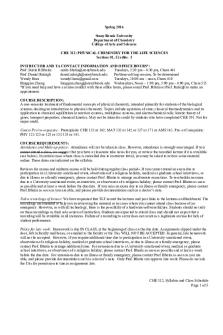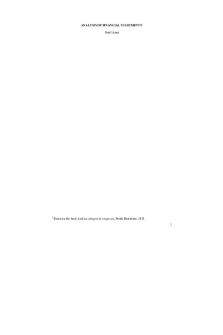Indiscriminate Behaviours (PDF) PDF

| Title | Indiscriminate Behaviours (PDF) |
|---|---|
| Course | Psychology 1A |
| Institution | University of New South Wales |
| Pages | 1 |
| File Size | 43.9 KB |
| File Type | |
| Total Downloads | 42 |
| Total Views | 136 |
Summary
Download Indiscriminate Behaviours (PDF) PDF
Description
Early psychosocial deprivation — High risk of indiscriminate behaviours! 1) Examine Indiscriminate behaviours in institutional children and home reared children! 2) Test foster care IF reduces indiscriminate social behaviours! 3) Examine early indicators of indiscriminate behaviours! Institutional children left in higher rates that never institutionalised control ! Fail developing organised attachments — Risk of indiscriminate behaviours! Bucharest Early Intervention Project! - Examine the effectiveness of foster care in reducing indiscriminate behaviours! Measures!
- Stranger at the Door Procedure! 0 - Stayed, 1 - Left, !
- Percent Time in Institution! - Caregiving Quality! - Birth Weight! - Cognitive Development! - Attachment! Results! 1) Institutionalised children more likely to leave ( 33% to 3.5% )! 2) Care As Usual Group - 44.9%, Foster Care Group 24.1%, Never Institutionalised Group 3.5%! 3) Foster Care Group - Attachment Disorganisation! Ever Institutionalised Group - Attachment Disorganisation, Caregiving!
Low Disorganisation - Leaving associated with Lower levels of caregiving quality! Institutional Deprivation was NOT a determining factor in later indiscriminate ate behaviours Disorganised Attachment Behaviour - Lack of use of caregiver in times of distress - Developed with Emotionally disrupted Caregiving - Frightened caregiving experience Limitation - Small Sample Size - Lack of record keeping
The development of early disorganised attachment is a powerful predictor of later indiscriminate behaviours...
Similar Free PDFs

Indiscriminate Behaviours (PDF)
- 1 Pages

ECO 1104 (Consumer Behaviours)
- 10 Pages

Buyer Behaviours
- 4 Pages

- 9 Pages

Common Good PDF - pdf
- 7 Pages

- 2 Pages

- 43 Pages

- 47 Pages

- 5 Pages

- 130 Pages

- 16 Pages

Pdf Daniel - pdf
- 223 Pages
Popular Institutions
- Tinajero National High School - Annex
- Politeknik Caltex Riau
- Yokohama City University
- SGT University
- University of Al-Qadisiyah
- Divine Word College of Vigan
- Techniek College Rotterdam
- Universidade de Santiago
- Universiti Teknologi MARA Cawangan Johor Kampus Pasir Gudang
- Poltekkes Kemenkes Yogyakarta
- Baguio City National High School
- Colegio san marcos
- preparatoria uno
- Centro de Bachillerato Tecnológico Industrial y de Servicios No. 107
- Dalian Maritime University
- Quang Trung Secondary School
- Colegio Tecnológico en Informática
- Corporación Regional de Educación Superior
- Grupo CEDVA
- Dar Al Uloom University
- Centro de Estudios Preuniversitarios de la Universidad Nacional de Ingeniería
- 上智大学
- Aakash International School, Nuna Majara
- San Felipe Neri Catholic School
- Kang Chiao International School - New Taipei City
- Misamis Occidental National High School
- Institución Educativa Escuela Normal Juan Ladrilleros
- Kolehiyo ng Pantukan
- Batanes State College
- Instituto Continental
- Sekolah Menengah Kejuruan Kesehatan Kaltara (Tarakan)
- Colegio de La Inmaculada Concepcion - Cebu



